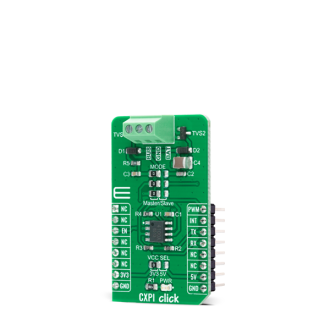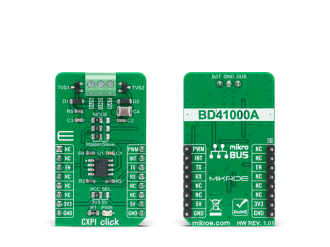
We strongly encourage users to use Package manager for sharing their code on Libstock website, because it boosts your efficiency and leaves the end user with no room for error. [more info]

Rating:
Author: MIKROE
Last Updated: 2020-11-17
Package Version: 1.0.0.0
mikroSDK Library: 1.0.0.0
Category: Interface
Downloaded: 3847 times
Not followed.
License: MIT license
CXPI Click is a compact add-on board that contains a transceiver that supports the next-generation automotive communication protocol. This board features the BD41000AFJ-C, a transceiver for the CXPI (Clock Extension Peripheral Interface) communication from Rohm Semiconductor.
Do you want to subscribe in order to receive notifications regarding "CXPI click" changes.
Do you want to unsubscribe in order to stop receiving notifications regarding "CXPI click" changes.
Do you want to report abuse regarding "CXPI click".


Library Description
The library covers all the necessary functions to control CXPI click board. Library performs a standard UART communication.
Key functions:
void cxpi_write_byte ( uint8_t input ) - Write Single Byte.uint8_t cxpi_read_byte ( void ) - Read Single Byte.uint8_t cxpi_byte_ready ( void ) - Check for new byte received.Examples description
The application is composed of three sections :
void application_task ( )
{
if ( app_mode == APP_MODE_TRANSMITER )
{
mikrobus_logWrite( "----------------------", _LOG_LINE );
mikrobus_logWrite( "", _LOG_LINE );
cxpi_write_data( &demo_message_data[ 0 ], 9 );
mikrobus_logWrite( " TX Data: ", _LOG_TEXT );
mikrobus_logWrite( demo_message_data, _LOG_LINE );
Delay_ms( 5000 );
}
}
Other mikroE Libraries used in the example:
Additional notes and informations
Depending on the development board you are using, you may need USB UART click, USB UART 2 click or RS232 click to connect to your PC, for development systems with no UART to USB interface available on the board. The terminal available in all MikroElektronika compilers, or any other terminal application of your choice, can be used to read the message.